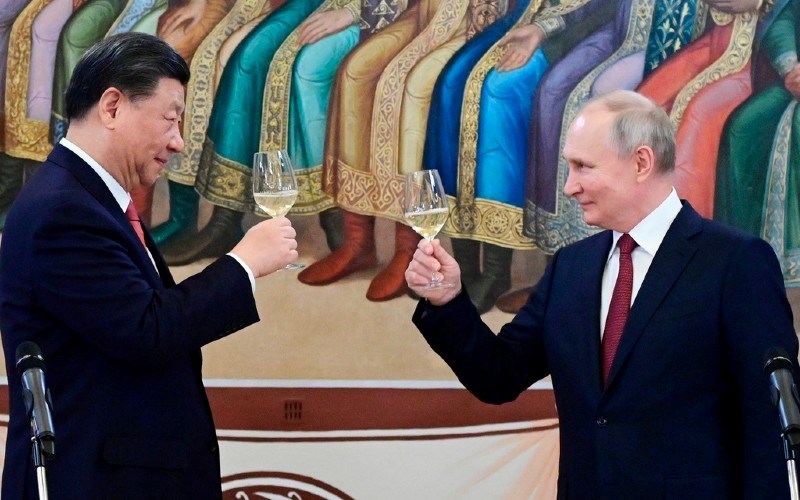Without naming China by name, the United States, South Korea and Japan have agreed to “elevate defense collaboration" in the Pacific Ocean, including the Taiwan Strait, according to the Department of Defense.
“This includes launching annual multidomain military exercises to bring trilateral defense cooperation to unprecedented levels," the DOD announced in recent weeks.
 Joint training exercises with allied—or like-minded—countries are not particularly surprising. A joint Russia-China naval flotilla sailed and exercised near the Aleutian Islands in early August as part of a 2,300-nautical mile naval exercise.
Joint training exercises with allied—or like-minded—countries are not particularly surprising. A joint Russia-China naval flotilla sailed and exercised near the Aleutian Islands in early August as part of a 2,300-nautical mile naval exercise.
Tass, the Russia state-owned media agency, said the purpose of the joint exercise was "strengthening the naval cooperation between Russia and China, maintaining peace and stability in the Asia-Pacific region, monitoring of offshore zones and guarding Russia and China's objects of maritime economic activities."
That joint exercise marked the third such joint patrol in recent years, according to Col. Grant Newsham (USMC-Ret.).
Now a senior fellow at the Center for Security Policy, Newsham worked closely with Japan's military leaders and its politicians. He has told AFN in previous stories the Japanese are now dramatically boosting their military spending because they fear China. That rivalry dates back centuries but Japan is alarmed by China's growing influence in the region and around the world.

While the Russians and Chinese may have “historical animosities,” Newsham points out they have "strategic interests" that are aligning. What is that interest? They both want to "destroy" the United States and its allies in the West, he warns.
Regarding that recent naval exercise near Alaska, Newsham says it was no accident they came so close to American territory.
"Rather, this was intentional," he says, "partly as a way of responding to U.S. naval and air operations in the South China Sea, and other locations, relatively close to China and Russia.”
 The flotilla did not pose a threat but was more a sign of "contempt" for their enemy.
The flotilla did not pose a threat but was more a sign of "contempt" for their enemy.
In time, he suspects the two countries will be operating in larger numbers around Alaska and the Arctic Sea.
For him, the exercises performed by Russia and China demonstrate “a considerable level of joint capabilities, and an ability to conduct necessary planning and coordination to conduct military operations together.” And as a result, he says, “U.S. forces are no doubt taking a notice.”
The Japanese are taking notice, too, he adds, because Chinese and Russian ships and aircraft keep entering Japanese waters and airspace.
'Get ready for a fight'
On a global scale, Newsham says, America has a "sizeable advantage" over China. So China's generals would be hard pressed to protect and defend their interests around the world. Those generals know that, too, so China is rapidly increasing its ports and airfields to operate around the world and balance U.S. dominance.
 "It will probably take the Chinese at least five years, a decade, or a bit more, to be operating around the world," he predicts, "but if the current trend line continues uninterrupted, it's just a question of time.”
"It will probably take the Chinese at least five years, a decade, or a bit more, to be operating around the world," he predicts, "but if the current trend line continues uninterrupted, it's just a question of time.”
Beyond that U.S.-China competition for dominance, the question on the minds of many is if a war is coming.
“The American people should get ready for a fight," Newsham warns, "a fight that’s going to be bloodier and costlier than few people alive today have seen.”
Calling it ironic, the retired Marine officer says the way to avoid that future war is for the U.S. to prepare for it and thus convince China not to fire the first shot. He doubts the Pentagon is doing that, however, and now China is catching up quickly to the U.S. which makes a military conflict more likely with each passing day.
So what should Americans do? Pray for peace, he says, and urge our leaders to strengthen our military capabilities.
Col. Grant Newsham (USMC-Ret.) is author of the book "When China Attacks: A Warning to America."







